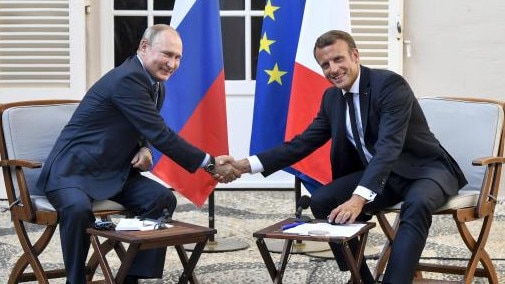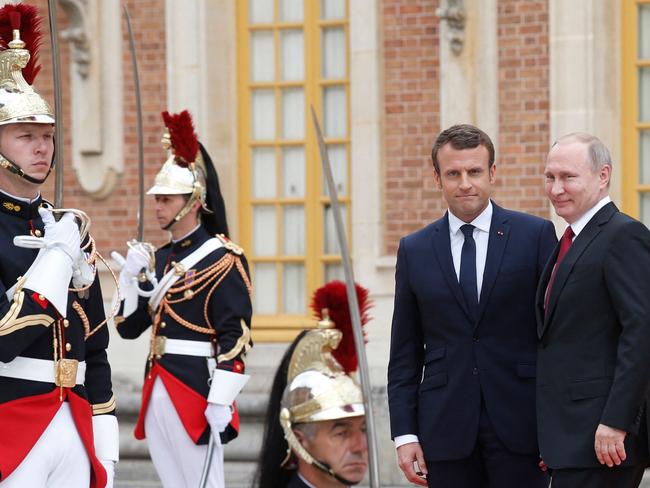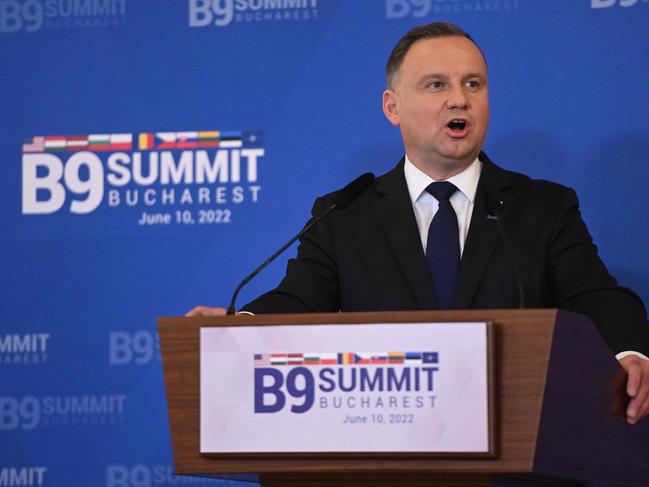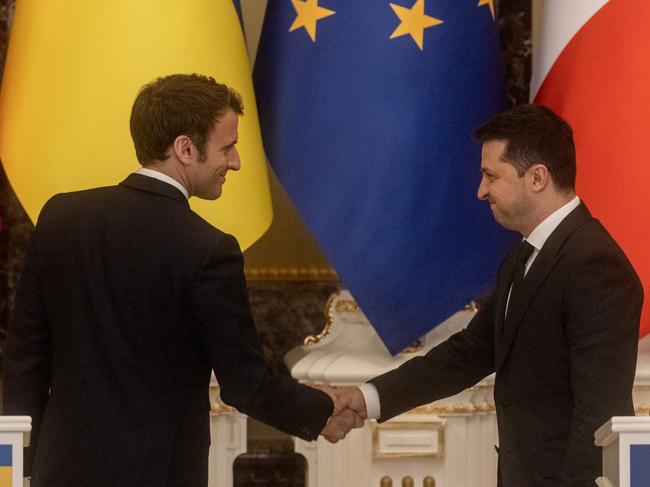History shows why Emmanuel Macron won’t humiliate Russian president Vladimir Putin
Franco-Russian ties go back centuries. They still seem to be shaping the French president’s response to the war in Ukraine.

Appearing in Kyiv beside Volodymyr Zelensky last week, Emmanuel Macron insisted that France had stood by Ukraine “from day one” of the Russian invasion. But has his visit, together with three fellow EU leaders, done enough to dispel concern that he and his country have been soft on Vladimir Putin?
Relations between Macron and Zelensky were once close. The Ukrainian leader came to Paris to consult Macron in the middle of his campaign for the presidency in April 2019. Like his host, the former comic actor was a political outsider. Several months later, Macron arranged and refereed Zelensky’s first, and only, meeting with Putin at the Elysee Palace.
Yet Macron’s dealings with the Kremlin leader have been even more extensive. He made improving relations with Moscow one of the keystones of his presidency, only to see his efforts to bring Russia in from the cold shattered by the invasion of Ukraine. Even since then he has continued to talk on the phone to Putin.
Macron’s desire to reach out to the Kremlin leader was, at first glance, surprising. Before the May 2017 election that brought him to power, Russia was blamed for planting unsubstantiated rumours on social media that Macron was having a gay affair. Moscow’s hand was also suspected in bizarre false claims last year that his wife, Brigitte, was born a man.
Putin would undoubtedly have preferred the election of Macron’s far-right rival, Marine Le Pen, whose campaign had been financed by a loan from a Russian bank, or Francois Fillon, of the centre-right Republicans, with whom the Russian leader had developed close ties when they were both prime ministers at the end of the 2000s.

In today (Sunday)’s French parliamentary elections Russia holds special significance for both of Macron’s principal rivals: Le Pen sees the country as a bulwark of traditional conservative values. Jean-Luc Melenchon, leader of the far-left France Unbowed party, has in the past advocated leaving Nato, backed Putin’s annexation of Crimea in 2014 and dismissed Ukraine as “a country that is struggling to be one”.
Just two weeks after his inauguration in 2017, Macron hosted Putin at Versailles, where they opened an exhibition marking the tercentenary of Tsar Peter the Great’s stay in France. The following year he went ahead with a trip to St Petersburg despite western outrage over the poisoning of the former Russian double agent, Sergei Skripal, in Salisbury.
And then, in August 2019, Macron invited Putin to his presidential residence on the Cote d’Azur, to discuss a new “architecture of trust and security” for Europe. Among those seated at the dinner that evening was Sylvie Bermann, then France’s ambassador in Moscow. Macron’s attempt to reach out to Putin was motivated by one main consideration, she said last week over a somewhat more modest lunch in Paris.
“Macron believed that if there was not a European policy towards Russia, then it would fall into the arms of China,” she said, noting the growing ties between Moscow and Beijing since the invasion have largely vindicated such fears.
Bermann believes that ideas being discussed at Fort de Bregancon might have led somewhere had it not been for the pandemic, which saw Putin withdraw from the world and indulge his obsession with Russian history.
If there is a difference now between France and some of its allies, it is not over the war itself, Bermann argues. It is what happens when, as with all conflicts, both sides finally sit down and talk. “We have to accept that Russia is a reality on the world stage and that it’s no use trying to get rid of it, to pretend it doesn’t exist.”

The idea of even so much as talking to Putin baffles many in Britain, whose political relations with Moscow have long been cool, even as we have opened the door to oligarchs not just to purchase our finest houses but also to buy their way into our establishment.
It is also anathema to Poland and the other countries of central Europe, who have lived for centuries in the shadow of their eastern neighbour and were Soviet vassal states for four decades; they, along with America and Britain, have been among the firmest supporters of Ukraine.
When Macron warned recently for a second time about the perils of “humiliating Putin”, Andrzej Duda, the Polish president, drew a comparison with World War II. “Did anyone say that Hitler must save face?” he demanded.
Yet other countries have drawn different lessons from their histories: Germany’s relations with Moscow have been shaped by a combination of guilt for World War II and gratitude to Mikhail Gorbachev, the Soviet president, for paving the way for reunification.
The extensive economic ties between the two countries, including a growing German dependency on cheap Russian energy, are an extension of the policy of Ostpolitik, launched by Willy Brandt in 1969, that saw closer ties as the key to maintaining peace.
There has been sympathy for Russia, too, in Italy and not just among members of its once powerful Communist party, which was a dominant force during the Cold War years. The Russian market has been important for its farmers, for its small businesses and energy giants. France, too has considerable commercial links with Russia: before the outbreak of war, thanks to carmaker Renault, the supermarket Auchan and the DIY chain Leroy Merlin, French companies were the country’s biggest foreign employer, providing jobs for 160,000 people. They have also been the slowest to pull out of Russia.

Underlying such links are cultural ties between the two countries’ elites that grew in the decades after the 1717 visit of Peter the Great. By the 19th century many Russian nobles spoke French among themselves, often taught by a tutor who had fled the French revolution.
“Traditionally, there’s been a certain romance about Russia among the French elite,” said Mark Leonard, director of the European Council on Foreign Relations think tank. “If you talk to the French, you hear a lot more about the cultural importance of Russia and Dostoyevsky and Tolstoy than you do in other countries.”
Such attitudes have had an impact on French politics: when Charles de Gaulle sought in the mid-1960s to limit American influence in Europe, he did so in part by turning to the Soviet Union, travelling to Moscow in 1966 and concluding a wide-ranging treaty on co-operation.
Another former president, Jacques Chirac, was close to Putin, joining him in opposing the US-led Iraq war.
Like Olaf Scholz, the German chancellor who accompanied Macron and the heads of Italy and Romania to Kyiv, the current French leader had long insisted he would visit Ukraine only if he had something to offer. In this case, it was not just six more French-made Caesar howitzers but also the promise that Ukraine would be put on the path to EU membership. Although the Caesars are powerful, France has supplied far less military aid to Ukraine than Britain or even Germany.
The EU invitation, endorsed by Ursula von der Leyen, the European Commission president, on Friday, is merely the beginning of what will prove a drawn-out process that could take a decade or more.
More important was what Macron and fellow leaders did not do – pressure Zelensky into a deal with Putin. Asked by an interviewer from French television which territorial concessions, if any, Ukraine should make to Russia, Macron replied simply: “This is up to Ukraine to decide.”
He knows though that for Kyiv, that calculation is becoming increasingly fraught. If and when the Ukrainian leader chooses to settle with Putin, Macron will be poised to play the peacemaker.
The Sunday Times





To join the conversation, please log in. Don't have an account? Register
Join the conversation, you are commenting as Logout